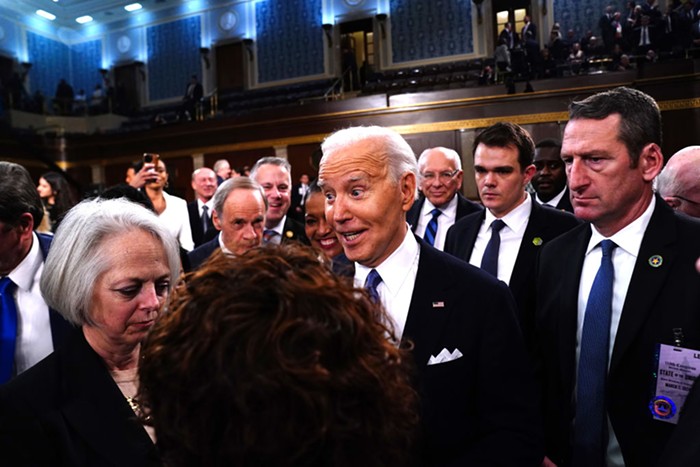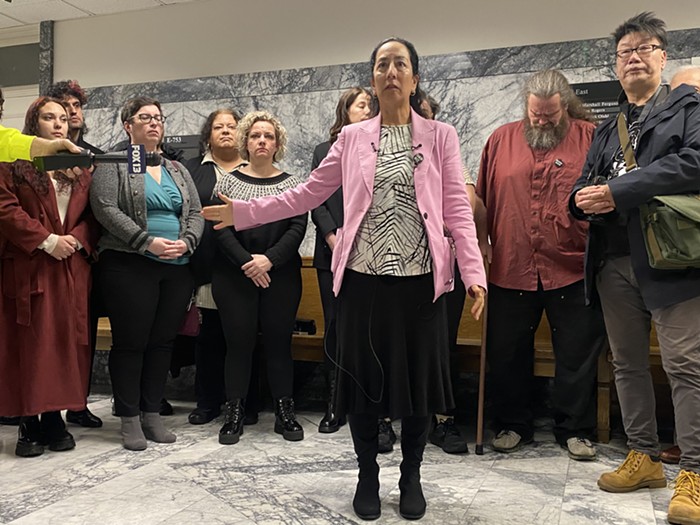
Today in the Boeing soap opera we learn that the plane corporation, which in 2001 treated Seattle like a burnt piece of bacon and moved to Chicago, a city Carl Sandburg described as the "Hog Butcher for the World," is now moving to the DC area. It wants to be close to government cheese because, clearly, it has no future in the market.
Twenty-one years after Boeing arrived in Chicago, the defense contractor and airplane-maker is moving its global headquarters out of the city, the company said Thursday.
Boeing will relocate to Arlington, Va., where it will also create a research and technology hub. The move will bring company executives closer to federal officials.
Boeing promises to "maintain a significant presence." But what's to maintain in the city of big shoulders? It doesn't make planes. All it got out of the move in 2001 was a tenant for a skyscraper in the second-largest central business district in the US. According to the Tribune, "The company did not immediately respond to questions about what its continuing presence would look like."
Adding a casino but losing Boeing. Not a good trade. https://t.co/lisaXZBlDB
— Mike (@MikeInChicago_) May 5, 2022
Don't take it personally, Chicago. Don't blame the mayor or crime. The corporation moved to your city to get away from unionized labor, but that didn't work out because planes started falling out of the sky. Combine that with the pandemic, and you pretty much have a company that had, as I pointed out, only one real choice to stay alive: nationalization. (I saw this coming in 2019, and yet no Pulitzer is attached to my name.) But nationalization, as with Keynesianism (deficit spending to supply the economy with effective demand) turns out to have two acceptable flavors: the market and the military. Boeing decided the latter nationalization strategy was the way to go. From Wikipedia: "Boeing ultimately announced the following year that it would move its corporate headquarters to Arlington, Virginia, where its defense division is located."
But Arlington, which is a part of the DC area, is also where Amazon has its second corporate headquarters (Amazon HQ2). This is interesting because Amazon Studios is working with Plan B and Succession star Jeremy Strong on a limited miniseries about the 737 MAX mess. Interestingly, Seattle Times' Dominic Gates is a consultant on the project. Why this is so, I really do not know. He never said a word about what the executives were really up to for an entire decade. Never even criticized management at all, which I did (read my post "How Seattle Times' Aviation Reporter, Dominic Gates, Contributed to the 737 Max Catastrophe"), and I pointed out not only its coming downfall but also its eventual nationalization. But Dominic Gates has, I suppose, the color of success in the United States, so it doesn't matter that he got everything wrong until it was too late.
Here is Dominic Gates gloating about the big bucks he is now making for doing perfectly nothing about Boeing's downfall when it mattered and could have saved lives:
For anyone worried about a Hollywood sensationalizing of the Boeing MAX saga, I can say this:
Though the project is in its early stages, so far I'm immensely impressed by the integrity of Terrio and Strong and their commitment to truth and authenticity. https://t.co/DrGEyIQLqb
— Dominic Gates (@dominicgates) May 5, 2022
Here is Boeing crying about its attempt to get on Donald Trump's good side in 2018: It has so far lost $660 million dollars on the pussy grabber's Air Force One deal. The company expects this loss to eventually enter billion-dollar territory. What were they thinking? Trump would be president forever? The company wants money from the government, not the other way around.
Here is the president of Amazon Labor Union, Christian Smalls, telling the Senate Budget Committee the facts of the matter. And his cool presentation, and the color of skin, reminds one of why, right after World War II, Ford and other carmakers in Detroit feared not so much unions but unions led by or with a large number of blacks. The move of production to the suburbs in the 1950s — a move that ultimately sapped economic power right out of Motown — was, as the scholar Thomas J. Sugrue explains in It's Called the Origins of the Urban Crisis: Race and Inequality in Postwar Detroit, in response to black union militarism. And one can see the key importance of racism in the US from this perspective.
WATCH: Opening statement from Christian Smalls (@Shut_downAmazon), Amazon Labor Union President, before the Senate Budget Committee.
Full video here: https://t.co/FPLeBtk7Hw pic.twitter.com/RTRzxBrO6b
— CSPAN (@cspan) May 5, 2022
So, Bernie Sanders tried to get the Senate to authorize a bill that would make it impossible for US semiconductor companies, benefitting from federal aid and research, to outsource jobs and attack unionization efforts. Only six senators voted for this pro-American jobs bill.
After abortion, next appears to be education. Austin American-Statesman reports that Gov. Greg Abbott "wants Texas to challenge a 1982 U.S. Supreme Court ruling that requires states to offer free public education to all children, including those of undocumented immigrants." The GOP is tired of the public school system producing troublemakers like Christian Smalls.
According to Heidi Groover, "the median home price in King County soared to a record high of nearly $1 million last month." Though the market is showing signs of taking a breath, we will in time totally become a million-dollar city.
Something to the tune of 20,000 "bankers, traders and other workers" in Shanghai presently live in the downtown office towers to keep business "running during the lockdown." Reuters reports: "Employees bedding down in offices were given air mattresses, pillows and blankets, and were relying on limited facilities. They have not been able to step outside since March 28...." Yes, you heard correctly. This sounds like a novel by J.G. Ballard.
Happy birthday, Karl Marx. As for that specter you wrote about in the Communist Manifesto, it no longer haunts just Europe. It haunts the whole world.
Happy Marx’s birthday. pic.twitter.com/XnNjbZ7iWR
— Doug Henwood (@DougHenwood) May 5, 2022
Speaking of Doug Henwood, the author of one of the best books about late-20th Century finance, Wall Street: How it Works and for Whom: I will be on a panel with him tomorrow, May 6, between 3 and 4 pm for the Red May festival. Tomorrow I will also expand on my post on Alito's specter during a 7 pm reading at the Hugo House.
Finally, I must also share this description of something I recently wrote for NYC art/theory journal eFlux:
Charles Mudede looks at the recent comedy series South Side and its brilliantly dystopian near-future scenario of rentier capitalist debt-servicing and hopeless speculation. Set in Chicago’s South Side, the show can be seen as a detailed Black analysis of a postwar American legacy of economic shocks, with one weapon hidden inside its comedy of capitalist totality: the wonder of an amateur astronomer. Meanwhile, Boris Groys considers the role of ancient and modern Gnostic doctrines in warding off the tyranny of reason. According to Groys, Gnostic roots ran through the particular “wisdom” of Soviet dialectical materialism. This allowed Soviet Marxism to integrate mysticism and philosophy in ways that were revolutionary to 1970s–80s philosophy, and still seem surprising and contradictory today.
Let's end Slog PM with a gorgeous work of old-school Chicago house, "Your Love." Chicago, you may no longer have Boeing, but you will always have Frankie Knuckles.



















